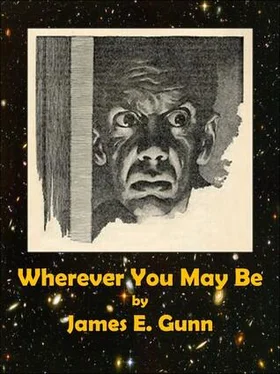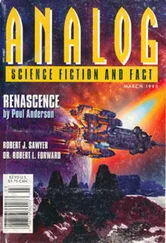James Gunn - Wherever you may be
Здесь есть возможность читать онлайн «James Gunn - Wherever you may be» весь текст электронной книги совершенно бесплатно (целиком полную версию без сокращений). В некоторых случаях можно слушать аудио, скачать через торрент в формате fb2 и присутствует краткое содержание. Жанр: Фантастика и фэнтези, на английском языке. Описание произведения, (предисловие) а так же отзывы посетителей доступны на портале библиотеки ЛибКат.
- Название:Wherever you may be
- Автор:
- Жанр:
- Год:неизвестен
- ISBN:нет данных
- Рейтинг книги:4.33 / 5. Голосов: 3
-
Избранное:Добавить в избранное
- Отзывы:
-
Ваша оценка:
- 80
- 1
- 2
- 3
- 4
- 5
Wherever you may be: краткое содержание, описание и аннотация
Предлагаем к чтению аннотацию, описание, краткое содержание или предисловие (зависит от того, что написал сам автор книги «Wherever you may be»). Если вы не нашли необходимую информацию о книге — напишите в комментариях, мы постараемся отыскать её.
Wherever you may be — читать онлайн бесплатно полную книгу (весь текст) целиком
Ниже представлен текст книги, разбитый по страницам. Система сохранения места последней прочитанной страницы, позволяет с удобством читать онлайн бесплатно книгу «Wherever you may be», без необходимости каждый раз заново искать на чём Вы остановились. Поставьте закладку, и сможете в любой момент перейти на страницу, на которой закончили чтение.
Интервал:
Закладка:
Matt sat up,. trying to make sense out of his charts. Despite their readings, Abbie hadn’t reacted dangerously to what should have been frightening physiological changes. He could be fairly safe in assuming that they always accompanied the appearance of her parapsychological powers — and she had certainly lived through those well enough.
But why was there such a difference in the way she reacted when she was happy and when she wasn’t? The first morning, when she had barely been able to assume conscious control, she’d been ravenously hungry. Today, when she had performed feats that made the others insignificant she was neither hungry nor abnormally exhausted. She was tired, yes, but there had been a measurable, though slight, expenditure of energy with each action, which, accumulated through their numerous experiments, could be expected to equal that required for an afternoon’s normal work.
What was different? Why, when she tried with what amounted to will-power alone, was it harder for her to move an object telekinetically than it would have been to do so physically? Why was the reverse true when she was unhappy?
Unless she was tapping a source of energy somewhere.
The thought sounded as though there might be something behind it. He reached for a blank sheet of paper and began jotting down ideas.
Disregarding the first morning’s experiments, when she was obviously succeeding despite this hypothetical force, what source of energy could she be contacting?
Well, what physical laws was she violating? Gravity? Inertia?
When Abbie was unhappy, she could nullify gravity — no, not exactly gravity — mass. Once she had done that, a process that might not require much energy at all, the object rose by itself, and, having no mass, could be pushed around easily. Somehow, by some unconscious mechanism, she could restore measured amounts of mass and — there was an idea trying to come to the surface of his thinking — of course! The energy created by the moving or falling body when mass was restored and gravity reasserted itself was channeled into her body. She stopped being a chemical engine sustained by food burned in the presence of oxygen, and became a receiver for the power generated by the moving bodies.
Writing quickly, he systematized what he had learned. Obviously, the energy restored when the manipulated objects fell or swooped back into place couldn’t quite balance the energy required to move them. She did get tired — but nowhere near as tired as she should have been. If she empathized with her feelings at such times, she retained a bare margin of control even when happy, but she lost the delicate ability to tap the energy thus liberated, and had to draw on her own body for the power.
Matt grimaced. If that was true — and his charts and graph confirmed it, then she ceuld never use her powers unless she was miserable.
And the key to that lay buried in the childhood of a little hill girl, who probably had been scolded and beaten, as hill children were when they were bad. In this case "bad" meaning a little girl who could move things without touching them, who had been confronted with the example of "Libby," the perfect little girl who would always have minded her mother, until she had come to associate the use of her powers only with unhappiness, with not being wanted, with rejection on the part of the people whom she loved.
Matt winced. You louse, Wright!
But it was too late to do anything about it now. He had to go on with what he was doing.
Abbie’s appetite wasn’t any better in the morning. She looked tired, too, as if she hadn’t slept. Matt stared at her for a moment thoughtfully, then shrugged and put her to work.
In a few minutes, Abbie could duplicate her feats with the table of the day before with a control that was, if anything, even finer. Matt extended his experiment to her subjective reactions.
"Let’s isolate the source," he said. "Relax. Try to do it with the mind alone. Will the table to move."
Matt jotted down notes. At the end of half an hour he had the following results:
Mind alone — negative.
Body alone — negative.
Emotions alone — negative.
It was crude and uncertain. It would take days or months of practice to be able to use the mind without a sympathetic tension of the body, or to stop thinking or to wall off an emotion. But Matt was fairly sure that the telekinetic ability was a complex of all three and perhaps some others that he had no way of knowing about, which Abbie couldn’t describe. But if any of the primary three were inhibited, consciously or unconsciously, Abbie could not move a crumb of bread.
Two of them could be controlled. The third was a product of environment and circumstances. Abbie had to be unhappy.
A muscle twitched in Matt’s jaw, and he told Abbie to try moving more than one object. He saw a cup of coffee rise in the air, turn a double somersault without spilling a drop, and sit down gently in the saucer that climbed to meet it. Matt stood up, picked the cup out of the air, drank the coffee, and put the cup back. The saucer did not wobble.
There were limits to Abbie’s ability. The number of dissimilar objects she could manipulate seemed to be three, regardless of size; she could handle five similar objects with ease, and she had made six slices of bread do an intricate dance in the air. It was possible, of course, that she might improve with practice.
"My God!" Matt exclaimed. "You could make a fortune as a a magician."
"Could I?" Abbie said without interest. She pleaded a headache and went to bed. Matt said nothing. They had worked for an hour and a half.
Matt lit a cigarette. The latent telekinetic power could explain a lot of things, poltergeist phenomena, for instance, and in a more conscious form, levitation and the Indian rope trick and the whole gamut of oriental mysticism.
He spent the rest of the day making careful notes of everything Abbie did, the date and time, the object and its approximate weight and its movements. When he finished, he would have a complete case history. Complete except for the vital parts which he did not dare put down on paper.
Several times he turned to stare at Abbie’s still, small form. He was only beginning to realize the tremendous potentialities locked up within her. His awareness had an edge of fear. What role was it he’d chosen for himself. He had been fairy godmother, but that no longer. Pygmalion? He felt a little like Pandora must have felt before she opened the box. Or perhaps, he thought ruefully, he was more like Doctor Frankenstein.
Abbie did not get up at all that day, and she refused to eat anything Matt fixed. Next morning, when she climbed slowly from her bunk, his apprehension sharpened.
She was gaunt, and her face had a middle-aged, haggard look. Her blonde hair was dull and lifeless. Matt had already cooked breakfast, but she only went through the motions of eating. He urged her, but she put her fork down tiredly.
"It don’t matter," she said.
"Maybe you’re sick," Matt fretted. "We’ll take you to a doctor."
Abbie looked at Matt levelly and shook her head. "What’s wrong with me, a doctor won’t fix."
That was the morning Matt saw a can of baking powder pass through his chest. Abbie had been tossing it to Matt at various speeds, gauging the strength of the push necessary. Matt would either catch it or Abbie would stop it short and bring it back to her. But this time it came too fast, bullet-like. Involuntarily, Matt looked down, tensing his body for the impact.
He saw the can go in…
Abbie’s eyes were wide and frightened. Matt turned around dazedly, prodding his chest with trembling fingers. The can had shattered against the cabin wall behind him. It lay on the floor, battered, in a drift of powder.
Читать дальшеИнтервал:
Закладка:
Похожие книги на «Wherever you may be»
Представляем Вашему вниманию похожие книги на «Wherever you may be» списком для выбора. Мы отобрали схожую по названию и смыслу литературу в надежде предоставить читателям больше вариантов отыскать новые, интересные, ещё непрочитанные произведения.
Обсуждение, отзывы о книге «Wherever you may be» и просто собственные мнения читателей. Оставьте ваши комментарии, напишите, что Вы думаете о произведении, его смысле или главных героях. Укажите что конкретно понравилось, а что нет, и почему Вы так считаете.












